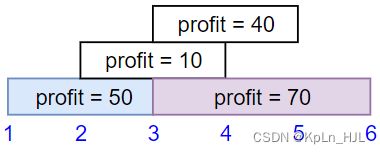leetcode - 1235. Maximum Profit in Job Scheduling
Description
We have n jobs, where every job is scheduled to be done from startTime[i] to endTime[i], obtaining a profit of profit[i].
You’re given the startTime, endTime and profit arrays, return the maximum profit you can take such that there are no two jobs in the subset with overlapping time range.
If you choose a job that ends at time X you will be able to start another job that starts at time X.
Example 1:
Input: startTime = [1,2,3,3], endTime = [3,4,5,6], profit = [50,10,40,70]
Output: 120
Explanation: The subset chosen is the first and fourth job.
Time range [1-3]+[3-6] , we get profit of 120 = 50 + 70.
Example 2:
Input: startTime = [1,2,3,4,6], endTime = [3,5,10,6,9], profit = [20,20,100,70,60]
Output: 150
Explanation: The subset chosen is the first, fourth and fifth job.
Profit obtained 150 = 20 + 70 + 60.
Example 3:
Input: startTime = [1,1,1], endTime = [2,3,4], profit = [5,6,4]
Output: 6
Constraints:
1 <= startTime.length == endTime.length == profit.length <= 5 * 10^4
1 <= startTime[i] < endTime[i] <= 10^9
1 <= profit[i] <= 10^4
Solution
Same as 2830. Maximize the Profit as the Salesman, this one is easier to read.
Use dp[i] to denote the maximum profit we could get by scheduling jobs[:i+1], then transformation equation is:
d p [ i ] = { 1 + d p [ i − 1 ] , if jobs[i] and jobs[i - 1] don’t overlap max ( d p [ i − 1 ] , 1 + d p [ k ] ) , else dp[i] = \begin{cases}\begin{aligned} 1 + dp[i - 1], \;\; &\text{if jobs[i] and jobs[i - 1] don't overlap} \\ \max(dp[i-1], 1 + dp[k]),\;\; &\text{else} \end{aligned}\end{cases} dp[i]={1+dp[i−1],max(dp[i−1],1+dp[k]),if jobs[i] and jobs[i - 1] don’t overlapelse
where k is the last index of the interval that doesn’t overlap with i
We could sort pairs by the end to use binary search, so the time complexity for searching would be log n \log n logn
Time complexity: o ( n log n ) o(n \log n) o(nlogn)
Space complexity: o ( n ) o(n) o(n)
Code
class Solution:
def jobScheduling(self, startTime: List[int], endTime: List[int], profit: List[int]) -> int:
tasks = [(startTime[i], endTime[i], profit[i]) for i in range(len(startTime))]
tasks.sort(key=lambda x:x[1])
dp = [item[2] for item in tasks]
end_indexs = [item[1] for item in tasks]
for i in range(1, len(dp)):
if tasks[i][0] >= tasks[i - 1][1]:
dp[i] = dp[i - 1] + tasks[i][2]
else:
insert_index = bisect.bisect_right(end_indexs, tasks[i][0])
if insert_index - 1 >= 0:
dp[i] = max(dp[i - 1], dp[insert_index - 1] + tasks[i][2])
else:
dp[i] = max(dp[i - 1], tasks[i][2])
return dp[-1]


